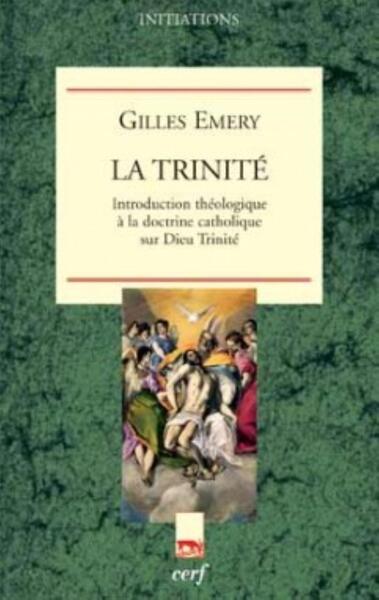- EAN13
- 9782204089180
- Éditeur
- Cerf
- Date de publication
- 20 août 2009
- Collection
- INIT GENERALES
- Nombre de pages
- 208
- Dimensions
- 21,5 x 13,5 x 1,8 cm
- Poids
- 266 g
- Langue
- fre
La Trinité, Introduction Théologique À La Doctrine Catholique Sur Dieu Trinité
Gilles Emery
Cerf
Prix public : 19,00 €
La Trinité est la " substance " du Nouveau Testament : la connaissance de la Trinité est la source et l'accomplissement de toute la vie chrétienne. Ce livre offre une introduction à l'enseignement catholique sur Dieu Trinité. Il prête une attention spéciale aux fondements de la réflexion trinitaire ainsi qu'à ses sources traditionnelles, capables d'offrir des critères de discernement. Il s'adresse à tous ceux qui souhaitent bénéficier d'une initiation à la doctrine trinitaire. Le chemin proposé par cet ouvrage d'introduction comporte six étapes. Ce livre indique tout d'abord des voies liturgiques et bibliques pour entrer dans la foi trinitaire. Il présente ensuite la révélation du Père, du Fils et du Saint-Esprit dans le Nouveau Testament, invitant à réfléchir sur la signification du mot " Dieu ". Puis il expose les confessions de la foi trinitaire, du Nouveau Testament lui-même jusqu'au credo de Constantinople dont il offre un commentaire. Sur ces bases, en s'appuyant sur la culture chrétienne trinitaire héritée des Pères de l'Église du IVe siècle, cet ouvrage présente les principes fondamentaux de la doctrine trinitaire qui trouvent leur sommet dans la notion chrétienne de " personne ". Le cœur de ce livre réside dans un exposé de synthèse sur la personne du Père, sur la personne du Fils et sur la personne du Saint-Esprit dans leurs relations mutuelles et dans leur action en notre faveur. Enfin, la dernière étape reprend l'étude de l'agir créateur et sauveur de la Trinité : elle s'achève par l'enseignement concernant les " missions " du Fils et du Saint-Esprit, c'est-à-dire l'envoi salvifique du Fils et du Saint-Esprit qui conduisent les hommes à la contemplation du Père. -- The Trinity is the 'substance' of the New Testament; knowledge of the Trinity is the source and the accomplishment of all Christian life. This book is an introduction to Catholic teaching on the Trinitarian God. It pays special attention to the foundations of Trinitarian reflection and to traditional sources, which can provide criteria for discernment. Written for all those who wish to benefit from an initiation to Trinitarian doctrine, this book proposes a journey in six stages. First of all, it indicates the liturgical and biblical paths to Trinitarian faith, then goes on to present the revelation of the Father, the Son and the Holy Spirit in the New Testament, inviting readers to meditate on the meaning of the word 'God'. It then presents the confessions of Trinitarian faith, from the New Testament itself to the Creed of Constantinople, offering a commentary on the latter. On this basis, and drawing on the Christian Trinitarian culture passed down from the 4th century Fathers of the Church, it presents the fundamental principles of the Trinitarian doctrine which reach their zenith in the Christian notion of 'person'. The heart of the book lies in a synthetic presentation of the person of the Father, the person of the Son and the person of the Holy Spirit in their mutual relations and their action in our favour. The final stage focuses on studies of the creative and redeeming acts of the Trinity, closing with a lesson concerning the 'missions' of the Son and the Holy Spirit, i.e. the sending of the Son and the Holy Spirit to save mankind by leading them to the contemplation of the Father.


















